Sordid Track Record of Five Years of NDA Government
T
he NDA government led by the BJP came back to power in the 1999 mid-term elections by resorting to jingoism on Kargil. The BJP could not get a majority on its own; so it roped in 22 other parties to form a coalition government called National Democratic Alliance (NDA). The NDA poll
 manifesto offered bountiful promises to all sections of the Indian people but did not fulfil most of them during its five years of fascist anti-people rule (see the promises and the sordid record of their non-fulfilment in the earlier three pages). Thanks to Modi's Hindtuva, Gujarat made 2002 the year of converting the state into a laboratory of Hindu Rashtra. The Sangh Parivar also tried to rekindle the Ayodhya issue, particularly since late 2001. Since 1998, the BJP has lost most of the Assembly elections held in the country, particularly in the Hindibelt. However, towards the end of 2003 it managed to win elections to the assemblies of Chattisgarh, Madhya Pradesh and Rajastan owing to an inept Congress with its soft Hindutva plank. To quickly cash the change in political scenario, taking advantage of the hype of the so-called "Feel Good Factor", the NDA government is pressing for early polls by April 2004. Below we trace in brief the sordid track record of the anti-people policies and measures taken by the NDA government, the first non-Congress government to complete five years in office.
manifesto offered bountiful promises to all sections of the Indian people but did not fulfil most of them during its five years of fascist anti-people rule (see the promises and the sordid record of their non-fulfilment in the earlier three pages). Thanks to Modi's Hindtuva, Gujarat made 2002 the year of converting the state into a laboratory of Hindu Rashtra. The Sangh Parivar also tried to rekindle the Ayodhya issue, particularly since late 2001. Since 1998, the BJP has lost most of the Assembly elections held in the country, particularly in the Hindibelt. However, towards the end of 2003 it managed to win elections to the assemblies of Chattisgarh, Madhya Pradesh and Rajastan owing to an inept Congress with its soft Hindutva plank. To quickly cash the change in political scenario, taking advantage of the hype of the so-called "Feel Good Factor", the NDA government is pressing for early polls by April 2004. Below we trace in brief the sordid track record of the anti-people policies and measures taken by the NDA government, the first non-Congress government to complete five years in office.
Surrendering Sovereignity to the US and Making an Enemy of Pakistan
The BJP, a constituent of the Sangh Parivar, is a master in double-speak, diversion and evasion. Though claiming to be ‘super-patriots’ and ardent ‘nationalists’, the Vajpayee government has crawled in submission before the Americans. The NDA government has entered into a ‘strategic partnership’ between the US and India directed against China and Pakistan.

The Indian partnership in strategic spheres of defence, military, high-tech trade, civilian, nuclear and space activities – with the sole superpower of the world, the US, has two components: the US strategy and the Saffron partnership for exploiting our national resources, undermining our economy, independence and national sovereignty. For example, under US pressure Vajpayee showed willingness to sign CTBT even though the treaty was not ratified by the US itself. People of India abhor such strategic subservience to imperialism.
It is under the bondage of this strategic relationship that the Vajpayee government did not oppose America's predatory war of occupation in Afghanistan. It also tried to stall the demand of condemning US aggression on Iraq. Advani and other senior BJP leaders have even expressed willingness to send Indian troops to Iraq as cannon fodder for US imperialism. Most shameful of all, we have an FBI office operating in Delhi, which represents a direct assault on our sovereignity. Talks are going on to provide a US military base in Indian soil.
Alliance with the US is a major hurdle before the process of strengthening our ties with the nations of South Asia, particularly Pakistan. Vajpayee’s growing strategic proximity to the US is fast reducing India to the status of a pitiable client-state of the US in the Asian region. Throwing overboard the time-tested policy of support to the Palestinian cause opposing Zionism, the Vajpayee Govt. has entered into the Indo-US-Israel unholy nexus. For the first time in Indian history, it invited killer Ariel Sharon, the Prime Minister of Israel to India. The politics of this nexus runs counter to the economics of third world solidarity.
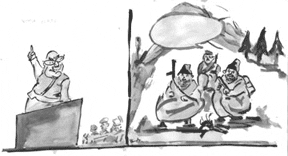
During the NDA’s earlier innings at the Centre, nuclear tests Pokhran-II took place on May 11 and 13, 1998. In its second term the NDA government has continued with nuclear sabre-rattling, including the decision to release the nuclear doctrine, to appoint Nuclear Command Authority furthering preparations for weapons deployment to step us arms race.
The Vajpayee government has wasted time and energy, as well as toiling people's precious lives, property and money for more than five years just to keep the Pakistan card alive. Following Pokhran Nuclear tests in 1998, the country saw a sharp rise of 14% in defence budget. The failure of Vajpayee's 'Bus diplomacy' led to the Kargil war. The Agra summit that followed, miserably failed because saffron hardliners led by Advani had been insisting on "coercive diplomacy" and the options of "hot pursuit" and "pre-emptive strikes" on so-called terrorist camps in Pakistan.
It cannot be denied that the rise of Hindu nationalism to power in India has strengthened religious fundamentalism in Pakistan and Bangladesh, leading to attacks on minorities and rape of Hindu women in Bangladesh.The more India relies in nexus with US-Israel, the more difficult would it become to forge friendly cooperation in the sub-continent.
Establishing a Fascist Rule by Violating Political Liberty
In its bid to subvert democratic features of the Indian Constitution, the NDA govt. appointed a Constitution Review Commission, headed by  Justice Venkatachellaiah, known for his soft corner towards the RSS. Irked over being dislodged from power by one vote, the BJP had constitution review in the National Agenda of Governance. Obliging the BJP, the commission has come up with some impractical recommendations like "constructive vote of no confidence" and "election of the leader (i.e., prime minister) by the house itself in the same way as the speaker in case no party gets clear majority". However, one of the main purposes of constituting the commission, i.e., debarring persons of "foreign origin" from occupying high posts, was defeated.
Justice Venkatachellaiah, known for his soft corner towards the RSS. Irked over being dislodged from power by one vote, the BJP had constitution review in the National Agenda of Governance. Obliging the BJP, the commission has come up with some impractical recommendations like "constructive vote of no confidence" and "election of the leader (i.e., prime minister) by the house itself in the same way as the speaker in case no party gets clear majority". However, one of the main purposes of constituting the commission, i.e., debarring persons of "foreign origin" from occupying high posts, was defeated.
The NDA Govt. steamrolled POTA despite countrywide opposition by convening an unprecedented joint session of Parliament, despite the established fact that the earlier such legislation, TADA, which the parties of NDA had vigorously opposed while in opposition, was grossly misused by many states. Under POTA, suspects can be detained for up to three months without charge, and up to three months more with permission of a special judge. POTA has already been selectively used against political dissenters in Tamil Nadu and Kashmir, (arresting Vaico, Gopalasamy etc) against minorities in Gujarat and indiscriminately against innocent people in the name of Naxalites in Jharkhand, even arresting minors and old-aged persons under the Act. However, perpetrators of anti-Muslim genocide in Gujarat and elsewhere, and vandals of Sangh Parivar, have nowhere been charged under this draconian Act.
True to its fascist nature, the BJP-led government has devised its own way of governance – by instilling fear. As Kuldip Nayar has noted, "The hard posturing by the BJP-led government has led to its being dictated by the fundamentalists". The Govt. has also not repealed other draconian acts like The Unlawful Activities (Prevention) Act, 1967, the National Security Act (1980) and the Essential Services Maintenance Act, 1981,etc.
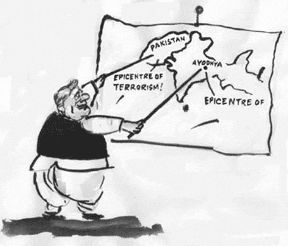
In the face of mounting opposition, the NDA government had to promulgate a cosmetic Prevention of Terrorism (Amendment) Ordinance and appoint ornamental Review Committees to review POTA cases. But the Review Committee could not discharge even V. Gopalaswami of MDMK who was arrested under POTA by Jayalalitha.
While establishing police states in J&K and the Northeast, Advani has asserted that human rights must take a back seat in their fight against so-called "terrorism". So they have curbed the powers of NHRC.
Pursuing the agenda of Hindu Rashtra
Launching total attack on the Indian democratic republic, the top BJP leaders publicly proclaim that their aim is to build a Hindu Rashtra.
The NDA Govt. led by Sangh Parivar rekindled of Ram Mandir issue while patronising VHP and Bajrang Dal.
It protected the killer Modi government of Gujarat, and went to the extent of browbeating the CEC Mr. Lyngdoh for his being a Christian.
While attacks on Christians and Muslims continued, Vajpayee called for a 'national debate on conversion' and favoured banning it.
Following the 9/11 terrorist attack in New York, when Bush pitched up demonising Islam embracing the plank of American nationalism and 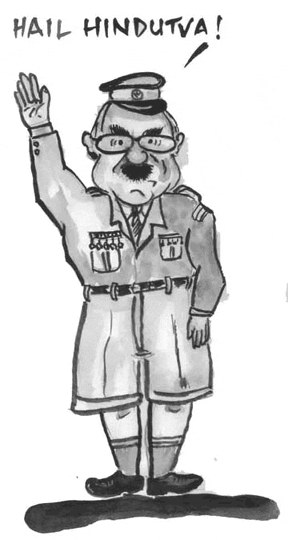 Christian conservatism, Hindutwa forces patonised by NDA Govt. received a new boost. Advani utilised the opportunity for imposing ban on SIMI in the name of war against terrorism. However, real terrorist outfit Bajrang Dal was not banned. Sangh Parivar has unleashed a vitriolic campaign against Madarsas.
Christian conservatism, Hindutwa forces patonised by NDA Govt. received a new boost. Advani utilised the opportunity for imposing ban on SIMI in the name of war against terrorism. However, real terrorist outfit Bajrang Dal was not banned. Sangh Parivar has unleashed a vitriolic campaign against Madarsas.
On 17 October 2001, Singhal and Togadia stormed into Ayodhya garbhagriha. Since then tension started brewing anew and it was during the journey of karsevaks from Ayodhya to Gujarat that Godhra happened in February 2002.
Since 28 February state sponsored anti-Muslim riots started in Gujarat which continued into March. The riots were clearly aimed at fascist ethnic cleansing, taking Gujarat as the laboratory of Hindu Rashtra. The enormity of the riots can be judged from the fact that after the riots when electoral rolls were being refreshed, 2.24 lakh voters could not be located. The NDA Govt. justified Modi's "reaction" theory and refused to dismiss Modi Govt. for its complicity in the riots.
Yet in March 2002, Vajpayee bowed down to the VHP demand of Bhoomi Pooja at Ayodhya. Advani toyed with the idea of bringing a legislation for building the Ram temple at Ayodhya. in April, Vajpyee demonised Muslims in the BJP's Goa meet, saying that they cannot live in peace with others.
To cash the anti-Muslim pogrom Modi decided to hold early elections. When the CEC did not oblige because time was needed to prepare fresh voter lists, the whole saffron establishment castigated him as anti-Hindu. Modi has appointed a noted criminal and anti-Muslim rioter Ashok Bhatt as Law Minister of Gujarat.
The partiality of Gujarat Govt. under Modi can be judged from the fact that following the acquittal of the culprits in Best Bakery case, Supreme Court commented that it did not have faith in Gujarat Govt.
It is not only Ayodhya. On 14 October 2001 BJP's youth wing activists vandalised world famous Taj Mahal, and on 21 December 2002, VHP and Bajrang Dal offered pooja at Qutub Minar. To reap communal harvest Sangh Parivar instigated Baba Budangiri issue in Karnataka and Bhojshala in Madhya Pradesh.
Filling the coffers of multinationals and Indian corporates and breaking the back of toiling millions
In its drive for all-out globalisation and liberalisation, the NDA government even surpassed the Rao-Manmohan duo of the Congress.
 Under the NDA government the GDP growth rate came down from 6.2% in 1996-97 to an average of around 5% in 1999-2003. The industrial growth rate came down from 11.7% in 1996-97 to 5% in 2000-01. Under the NDA government the public investment came down from 11.7% in 1985-86 to 6.3% in 2002-03.
Under the NDA government the GDP growth rate came down from 6.2% in 1996-97 to an average of around 5% in 1999-2003. The industrial growth rate came down from 11.7% in 1996-97 to 5% in 2000-01. Under the NDA government the public investment came down from 11.7% in 1985-86 to 6.3% in 2002-03.
The NDA government completely liberalised the import of consumer goods over the three import-export policies it presented from 1998-99 onwards
Unemployment tremendously increased during the NDA period. Growth rate of employment in the country fell drastically during the NDA government period.
|
Growth rates of employment (per cent change per
annum)
|
|
|
Rural
|
Urban
|
|
1983 to 1987-88
|
1.36
|
2.77
|
|
1987-88 to 1993-94
|
2.03
|
3.39
|
|
1993-94 to 1999-2000
|
0.58
|
2.27
|
Employment in the organised sector fell from 28.11 million in 1999 to 27.96 million in 2000. The number of unemployed persons has gone up from about 75 lakh in 1993-94 to 90 lakh in 1999-2000. The number of job-seekers on the live register of the Employment Exchanges was 405.9 lakh as on June 1999. The number of job seekers with Graduate and Post Graduate qualifications including technical persons was 50.8 lakhs. Out of this 1.7 lakh belong to engineering streams while 37.9 thousand were from medicine streams.
As per the information collected through Employment Market Information Programme of Directorate General of Employment & Training, the average growth rate of employment in public sector has come down to around 0.15% per annum during 1991-2000 from 2.08% per annum during 1983-89.
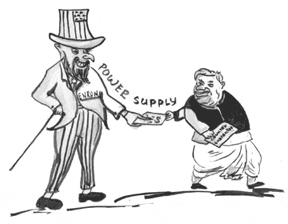
According to Economic Survey 2001-02, 5192 sick industrial units were registered under BIFR including 4930 private sector units and 95 Central PSUs and 167 State PSUs.
Data from the National Sample Survey (NSS) of households suggest that the proportion of people below the poverty line has remained more or less unchanged around 36 per cent in the 1990s.
The NDA government meekly surrendered to the demands of developed imperialist countries at the WTO and signed the treaty.
Declaring War Against Labour
The NDA government has proposed labour law changes against the interests of the working class. The NDA government appointed a Second Labour Commission without proper workers’ representatives on that and with anti-worker terms of reference to amend labour laws according to the needs of globalisation. It accepted the anti-labour recommendations of the Second Labour Commission.
The Vajpayee government declared a war against the workers in its 2001-02 budget proposing amendment to Section V-B of the Industrial Disputes Act to allow industrial units with upto 1000 workers to close down without government permission and to Section 10 of the Contract Labour Act to legalise the contract labour system. The government also amended the Trade Union Act of 1926, imposing higher membership criteria for registration and restriction on outside leadership.
The Centre deployed the army against the striking power sector workers on the request of the UP government.
The Centre deployed navy personnel against the striking port and dock.workers.
The NDA government proposed to restructure ESI and Pension schemes.
The number of mandays lost due to lockouts is almost four times than the number of mandays lost due to strikes in 2001.
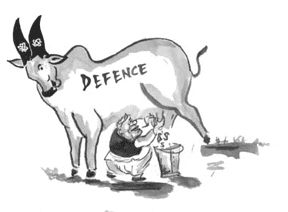 The Union budget 2001-02 announced the decision to cut government staff strength by 10% in five years. That would mean a loss of 66,000 jobs per year.
The Union budget 2001-02 announced the decision to cut government staff strength by 10% in five years. That would mean a loss of 66,000 jobs per year.
The Vajpayee government started privatisation of even profit-making PSUs. Despite a powerful resistance by BALCO workers the company was handed over to Sterlite Industries for a song.
The NDA government refused to fix mandatory floor-level minimum wage at the Centre.
The rate of unemployment increased from about 6 per cent in 1993-94 to 7.3 per cent in 1999-2000.
The NDA government did not pass a comprehensive legislation for agricultural labourers but clubbed agricultural labour within the Unorganised Sector Workers Bill. Under objection from the Finance Ministry, the Unorganised Labour Bill was also shelved.
Labour Minister Sahib Singh Verma announced on November 7, 2003, a five-year waiver for units in special economic zones from contribution to the Employees Provident Fund and the Employees State Insurance Scheme. Verma also said the government had also decided in principle to allow fixed-term labour contracts in other areas of the economy.
Pushing Farmers to Commit Suicide and Poor Peasants, Plantation and Urban Labourers to Die of Starvation
The policies of the NDA government under the garb of so-called "second generation reforms" have led to an acute rural crisis in India resulting in the twin tragedies of farmers’ suicides and starvation deaths.
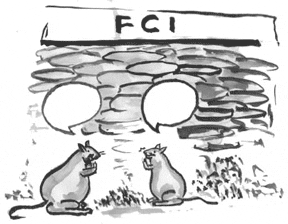
The NDA government attempted to disband state procurement of foodgrains. The foodgrains in the FCI godowns is rotting but it is neither being distributed through PDS nor given to the poor through food for work schemes. PDS prices of foodgrains were repeatedly increased by the Vajpayee government. The prices of PDS foodgrains, fertilisers, kerosene and LPG have been increased by the Vajpayee government in the union budget 2000. The governemnt has cut subsidies on fertilisers, pesticides, irrigation, power and all other inputs making agrarian production costlier.
The Vajpayee government resorted to massive import of edible oils and harmed farmers producing oilseeds.
Evicting Adivasis from their Homelands
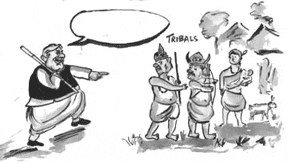 The Sangh Parivar outfits were engaged in forcible Hinduisation of tribals.
Union Ministry of Environment and Forest issued a circular to all the states to evict tribals from their traditional homelands. The Sangh Parivar organised forcible reconversion of tribals.
The Sangh Parivar outfits were engaged in forcible Hinduisation of tribals.
Union Ministry of Environment and Forest issued a circular to all the states to evict tribals from their traditional homelands. The Sangh Parivar organised forcible reconversion of tribals.
Fishing in Troubled Waters in the Northeast While Pitting One Tribal Community against the Other
The NDA government refused to grant autonomous state status to Karbi Anglong and North Kachar Hills under Constitutional provision 144(A).
Through selective and partial accords the NDA government resorted to the policy of divide and rurle in the Northeast and instigated ethnic conflicts. This has given rise to clashes between Nagas and Manipuris, Nagas and Kukis, Kukis and karbis, Bodo and Karbis and several other inter-ethnic clashes. Also, through half baked accords militants are recruited for "anonymous killing" to serve the purpose of the administration.
The NDA government provoked tension and unrest in Manipur through its untenable accord with NSCN. But it reaped harvest in Nagaland Assembly elections winning five seats and has secured foothold in other states too with its policy of divide and rule.
Continuing Police State in Kashmir and Refusing Autonomy
The Centre is continuing a police state in Kashmir.
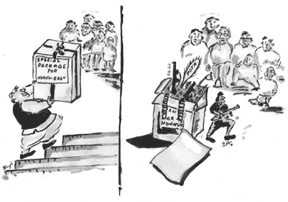 The Vajpayee government consistently refused to talk to Kashmiri groups.
The Vajpayee government consistently refused to talk to Kashmiri groups.
The BJP leaders are not refuting Sangh Parivar’s call for trifurcation of Kashmir.
The BJP leaders are openly demanding that Article 370, giving special position to J&K, should be scrapped. The BJP even turned down autonomy proposal passed by its own ally, the National Conference.
Saffronisation Drive
Under the BJP government new history books were introduced in schools with distorted history written by Sangh Parivar historians.
Sangh Parivar historians.
 The NDA government’s “National Curiculum Framework for School Education” was a narrow, exclusionist, chauvinist and sectarian framework.
The NDA government’s “National Curiculum Framework for School Education” was a narrow, exclusionist, chauvinist and sectarian framework.
The NDA government appointed RSS persons in key academic institutions like ICHR (MGS Narayanan), ICSSR (VR Panchamukhi) and NCERT (J.S.Rajput) and launched a witch-hunt against leftist academicians. Especially there was a concerted campaign against renowned historians Romila Thapar and Bipin Chandra. BJP and other Sangh Parivar outfits demand the ouster of KN Pankikkar as Vice-Chancellor of Sankaracharya University, Kerala.
Under the NDA directive the University Grants Commission introduced astrology as a subject of study in the universities.
The BJP attacked progressive, secular, and feminist intellectuals as pseudo-secularists, and it harassed theatre activists and filmmakers. Deepa Mehta was attacked and her unit prevented from shooting Water at Varanasi. Earlier there were veiled attacks on Fire.
MF Husain’s paintings were destroyed and permission given for his prosecution for his art work.
Murli Manohar Joshi tried to curb the autonomy of IITs and IIMs.
Cheating and Degrading Women
The NDA government did not pass the Women’s Reservation Bill providing 33% reservation to women in parliament and state legislatures despite making a poll promise to that effect.
The NDA government introduced a shabby Domestic Violence Bill in the parliament. All progressive women’s organisations opposed the bill as grossly inadequate. The bill was referred back to the Law Ministry for further revision and never saw the light of the day again.
The Supreme Court set down detailed guidelines on sexual harassment at the workplace in the Vishaka case. Some women’s organisations drafted a model bill which was taken up by the National Women’s commission which made further revisions to it and proposed that the government pass a legislation on that. The NDA government simply ignored it.
Though Advani indulged in tall talks about capital punishment for rapists, the number of rapes increased during the NDA period. The BJP made Muzaffarnagar rape case the main poll issue in Uttarakhand but after coming to power did not do anything about it.
Violence against women, both domestic and at workplace, continues to exist as is evident from the increasing incidents of rape, dowry-related cruelty and murders. International Initiative for Justice in Gujarat, an international committee of women’s organisations condemned systematic violence against minority women in Gujarat and described the situation in Gujarat worse than in Bosnia. The employment of women started declining after 1996.

 manifesto offered bountiful promises to all sections of the Indian people but did not fulfil most of them during its five years of fascist anti-people rule (see the promises and the sordid record of their non-fulfilment in the earlier three pages). Thanks to Modi's Hindtuva, Gujarat made 2002 the year of converting the state into a laboratory of Hindu Rashtra. The Sangh Parivar also tried to rekindle the Ayodhya issue, particularly since late 2001. Since 1998, the BJP has lost most of the Assembly elections held in the country, particularly in the Hindibelt. However, towards the end of 2003 it managed to win elections to the assemblies of Chattisgarh, Madhya Pradesh and Rajastan owing to an inept Congress with its soft Hindutva plank. To quickly cash the change in political scenario, taking advantage of the hype of the so-called "Feel Good Factor", the NDA government is pressing for early polls by April 2004. Below we trace in brief the sordid track record of the anti-people policies and measures taken by the NDA government, the first non-Congress government to complete five years in office.
manifesto offered bountiful promises to all sections of the Indian people but did not fulfil most of them during its five years of fascist anti-people rule (see the promises and the sordid record of their non-fulfilment in the earlier three pages). Thanks to Modi's Hindtuva, Gujarat made 2002 the year of converting the state into a laboratory of Hindu Rashtra. The Sangh Parivar also tried to rekindle the Ayodhya issue, particularly since late 2001. Since 1998, the BJP has lost most of the Assembly elections held in the country, particularly in the Hindibelt. However, towards the end of 2003 it managed to win elections to the assemblies of Chattisgarh, Madhya Pradesh and Rajastan owing to an inept Congress with its soft Hindutva plank. To quickly cash the change in political scenario, taking advantage of the hype of the so-called "Feel Good Factor", the NDA government is pressing for early polls by April 2004. Below we trace in brief the sordid track record of the anti-people policies and measures taken by the NDA government, the first non-Congress government to complete five years in office.


 Christian conservatism, Hindutwa forces patonised by NDA Govt. received a new boost. Advani utilised the opportunity for imposing ban on SIMI in the name of war against terrorism. However, real terrorist outfit Bajrang Dal was not banned. Sangh Parivar has unleashed a vitriolic campaign against Madarsas.
Christian conservatism, Hindutwa forces patonised by NDA Govt. received a new boost. Advani utilised the opportunity for imposing ban on SIMI in the name of war against terrorism. However, real terrorist outfit Bajrang Dal was not banned. Sangh Parivar has unleashed a vitriolic campaign against Madarsas.
 The Union budget 2001-02 announced the decision to cut government staff strength by 10% in five years. That would mean a loss of 66,000 jobs per year.
The Union budget 2001-02 announced the decision to cut government staff strength by 10% in five years. That would mean a loss of 66,000 jobs per year.
 The Sangh Parivar outfits were engaged in forcible Hinduisation of tribals.
Union Ministry of Environment and Forest issued a circular to all the states to evict tribals from their traditional homelands. The Sangh Parivar organised forcible reconversion of tribals.
The Sangh Parivar outfits were engaged in forcible Hinduisation of tribals.
Union Ministry of Environment and Forest issued a circular to all the states to evict tribals from their traditional homelands. The Sangh Parivar organised forcible reconversion of tribals. The Vajpayee government consistently refused to talk to Kashmiri groups.
The Vajpayee government consistently refused to talk to Kashmiri groups.